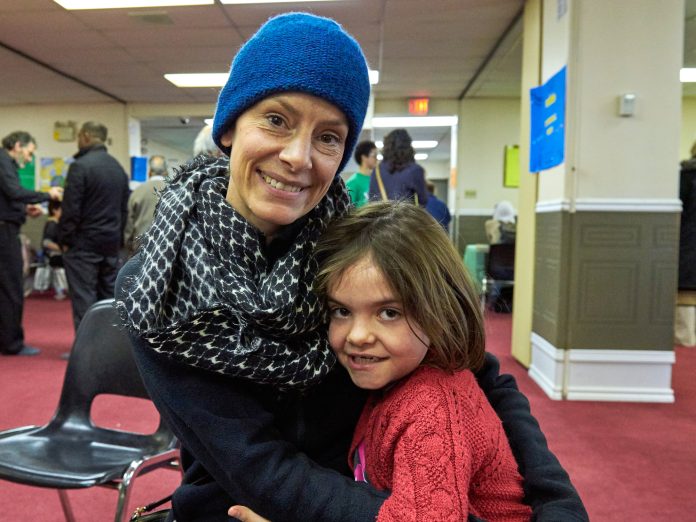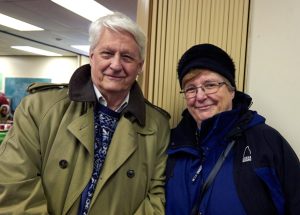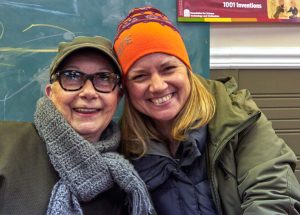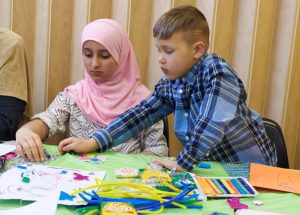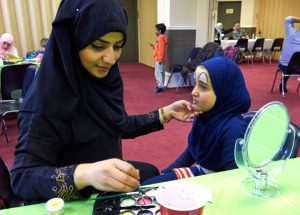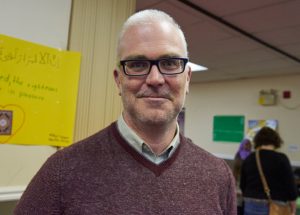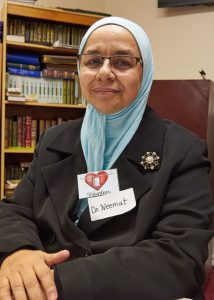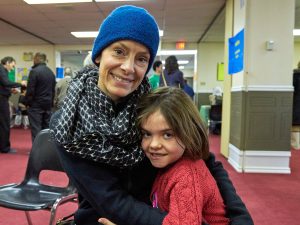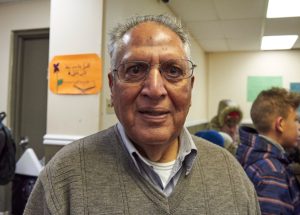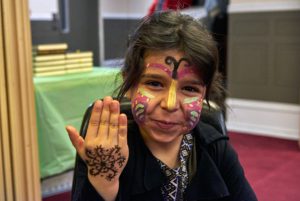By Bhavana Gopinath –
It’s a steady stream of visitors at The Ottawa Muslim Association’s “Open Doors, Open Hearts” event at the Ottawa Mosque on March 11. Despite the bitter cold, people took the time to support their Muslim brethren and to learn about a religion that is often misunderstood.
Volunteers from the mosque are delighted to greet the visitors, take their coats, show them where to place their shoes, and guide them on a tour of the building. These guides, many of them teenagers, show visitors the majestic main prayer hall, the community rooms, and provide a quick Islam 101 lesson—the five tenets of Islam, the Prophet, the prayers five times a day. Visitors listen intently to the guides and ask many questions about the religion, women’s rights, the hijab, and about fasting during Ramadan.
The Imam, Samy Metwally, and a couple of volunteers are seated in the downstairs room to provide in-depth answers to questions. There are kids everywhere; some have an impromptu game of tag, some patiently await their turn at the face-painting station and others were busy colouring. A henna artist makes intricate henna designs on women’s and kids’ hands. A little boy scans the crowd for visitors, and gives out hand-made thank-you cards. Over at the corner, teenagers manage a table laden with food. “Please eat,” a volunteer urges.
“We really feel the warm welcome,” says Caddy Ledbetter, from the Bayswater area. She is here with her two daughters aged 4 and 7. Her family is not religious, she says, but her older daughter has been learning about world religions in school and both are curious about Islam. So, Caddy figured the best thing to do was to bring them here. “This is amazing,” she says. “My kids are going to have such a wonderful memory of visiting the mosque; they’ll remember that they met lovely smiling people.”
Kitchissippi residents Daniel and Blandine Stringer agree about the warm welcome. Daniel has come here today to support his “brothers and sisters.” In these difficult times, he says, religions should work together to break down barriers between people. Blandine serves on the board of the Capital Region Interfaith Council and knows the Imam from her work there. So, when she heard about the open house, she says, she had to come.
Councillor Jeff Leiper is here to back the Ottawa Mosque’s outreach initiative as well. “I am privileged to be the councillor of a ward that has such a warm and generous community,” he says. Some people, unfortunately, have preconceptions, he says, that come from a lack of knowledge or a fear of the unknown. An event like this provides an opportunity to dispel misconceptions and increase awareness about the community.
Indeed, this open house, the second in as many months, is meant to spread knowledge, especially considering the recent events in Quebec, and related media coverage, says Naeem Mallik, the president of the Ottawa Muslim Association.
“People are pleasantly surprised when I explain to them that Islam, Christianity and Judaism have common roots, and that Islam is inherently peaceful and forbids the killing of innocents,” he says. Islam also preaches good neighbourliness, and he says that the local community has been wonderfully supportive.
Naeem has served the Association since 1962, and knows first-hand the value of mutual respect between religions: while growing up in India, he counted Hindus among his closest friends, and later studied in a Christian missionary institution. “Everybody should have an open mind,” he says.
An open-minded attitude brings Piccadilly residents Linda Banys and her daughter Mackenzie Banys here. Mackenzie’s colleague told her about the open house, and mother and daughter decided to come and learn more about Islam and the community. The mosque is helping to break down barriers, they say, and the “fabulous” women have made them feel so welcome, that they would feel comfortable walking in here any day. Mother and daughter asked the volunteers many questions about the religion, including the wearing of the hijab. Dr. Neemat, another Kitchissippi resident who is volunteering, provides an explanation. There are several reasons women wear a hijab, she says, but as a practicing psychologist, there is one that resonates with her: Modest attire, of which the hijab is an integral part, places all women on a somewhat equal footing in terms of beauty or attractiveness. Hence self-esteem issues, especially in teenaged girls, become less problematic.
Dr. Neemat is from Egypt, and moved to Canada four years ago to help with her daughter’s baby. She recalls an “open doors” event she attended at Saint Paul University. She was drawn to the institution for two reasons. First, the buildings reminded her of her Catholic school in Egypt, and second, they offered a Master’s program in her two interests, spirituality and counselling. She completed her Master’s at Saint Paul, and now works as a couples’ counsellor. She has worn the hijab almost all her life, and points out that many religions do exhort their followers to wear some kind of head covering, like a skullcap, or a scarf, or even a turban. Canadians are very accepting, she says, and she has never faced any discrimination because of her hijab. She recalls an instance in another country: at a medical conference, where a fellow participant looked askance at this English- and French-speaking, hijab-clad Egyptian doctor. “I said to him, my hijab only covers my head, it doesn’t block my tongue or my brains,” she laughs.
At the end of their tour, visitors are given long-stemmed roses as a parting gift. Each flower has a small card attached, with quotes from the Prophet and the Holy Quran. The quotes are words to live by: choose your religion as carefully as you would choose your friends; it is better to sit alone than fraternize with the bad; silence is better than idle words.
When the guides accompany the visitors to the door and see them off, they enquire if all their questions were answered, and if they had a good time. Judging from the smiles on the visitors’ faces, the answer is a clear and resounding “Yes!”
